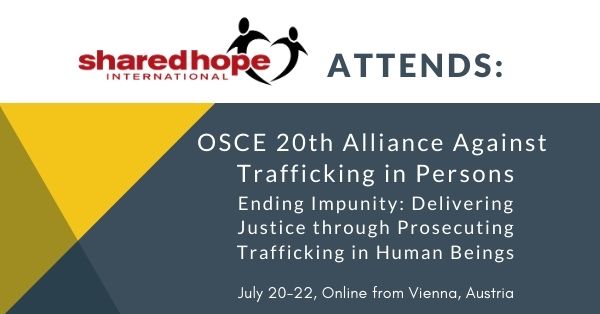By: Natalie Assaad

The OSCE Office of the Special Representative and Co-Ordinator for Combating Trafficking in Human Beings held the 20th OSCE Alliance Conference against Trafficking in Persons this past week from July 20 – 22, 2020. In reflection of the 20th anniversary of the passing of the Palermo protocol, the conference focused on the lack of impunity of trafficking perpetrators globally. Despite an estimated 25 million victims of trafficking, only 11,096 traffickers were prosecuted in 2019. This amounts to approximately one prosecution for every 2,275 victims.
Conducting financial investigations in trafficking cases was emphasized by panelists and speakers, and first discussed by Albania’s Minister of Interior, Mr. Sandër Lleshaj. He discussed the importance of confiscating money and assets in trafficking cases, which was addressed by an Albanian law passed in 2020. This law requires individuals to prove the legality and origins of their assets if they were previously convicted of a particular set of criminal activities, including human trafficking. Barry Koch, Commissioner on the Financial Sector Commission on Modern Slavery and Human Trafficking, further discussed the use of financial data and records as effective weapons in fighting trafficking. Not only does financial data identify victims and perpetrators, but it proves coercion, corroborates witness testimony, and is the driving force behind a perpetrator’s activities. Mr. Koch recommended expanding the use of forfeiture assets to provide remedies to survivors, implementing global standards of crypto currency and the dark web to prevent criminal anonymity, and encouraging financial institutions to conduct periodic risk assessments to evaluate their exposure to human trafficking.
Ghada Waly, the Executive Director of the United Nations Office on Drugs and Crime (UNODC) discussed the effects of COVID-19 on human trafficking. The UNODC found that the increase in time spent online has provided traffickers with more opportunities to exploit victims while surges in poverty rates has heightened victim vulnerability. The UNODC also looked at past economic recessions and pandemics to study how the current pandemic may exacerbate trafficking. They found that countries who had higher unemployment rates as a result of not recovering as fast as other countries also had an increase in cross-border human trafficking.
Hilary Axam, the Director of the Human Trafficking Prosecution Unit at the Department of Justice, emphasized the need for a victim-centered, trauma-informed response for survivors, along with the necessity of political will. Not only does a victim-centered, trauma-informed response require intensive training, but it requires the unlearning of typical training law enforcement receives. For example, a survivor’s difficulty in recalling memories, emotional reactions, or conflicting statements are typically viewed as unreliable by law enforcement, however trauma-informed expertise indicates that these actions are common in traumatized survivors. Further, mobilizing political will is crucial, but is a resource-intensive undertaking that does not provide quick results.
On the last day, Dr. Myria Vassiliadou, an independent expert and former EU anti-trafficking coordinator, provided a compelling presentation on anti-demand and the trafficking chain. Dr. Vassiliadou pointed out that our culture not only tolerates tens of thousands of trafficking victims but normalizes it through society and criminal justice systems. She stated that any criminal justice system that treats trafficking in a restricted manner by focusing only on the trafficker or victim instead of the trafficking chain and driving forces is bound to fail – as proven by the current statistics of prosecutions and victims internationally. Dr. Vassiliadou stressed the fact that trafficking is purely economically driven, and that impunity can only be achieved by eliminating economic demand.
Valiant Richey, Special Representative and Co-Ordinator for Combating Trafficking in Human Beings, ended the conference with a necessary proposal –that all participating states triple the number of current prosecutions within the next three years. Mr. Richey stated that his office will offer support to participating states in designing and implementing effective strategies, such as training judges and law enforcement, conducting more financial investigations, building more prosecutions without survivor testimony, and implementing victim-centered, trauma-informed approaches.
Though shared from an international perspective, several of the themes and concerns addressed throughout the conference directly impact the United States’ response to domestic minor sex trafficking. For example, Dr. Vassiliadou emphasized the need to diminish demand and address the entire trafficking chain. Under federal law, buyers can be identified as sex trafficking offenders with or without the existence of an identified trafficker. However, the trafficking laws in several states exclude buyer conduct, and others fail to prosecute buyers despite their laws. In recognizing that the sex trafficking industry is fueled by demand and failing to address it comes at the cost of thousands of children’s lives, Shared Hope has developed a body of anti-demand resources. For more information, please visit https://sharedhope.org/resources/policy-research-resources/#endingdemand.
Further, the conference’s emphasis on political will strongly aligns with Shared Hope’s policy work. Shared Hope works tirelessly with survivors, advocates, and legislators to reform legislation in order to promote the non-criminalization of child survivors and the implementation of specialized services. This avoids re-traumatization of child survivors and equips states to respond with a trauma-informed, victim-centered approach through individualized, specialized services. For more information on Shared Hope’s non-criminalization efforts, please visit https://sharedhope.org/what-we-do/bring-justice/non-crim/. You can also take action by signing Shared Hope’s petition to end the criminalization of child sex trafficking survivors.






